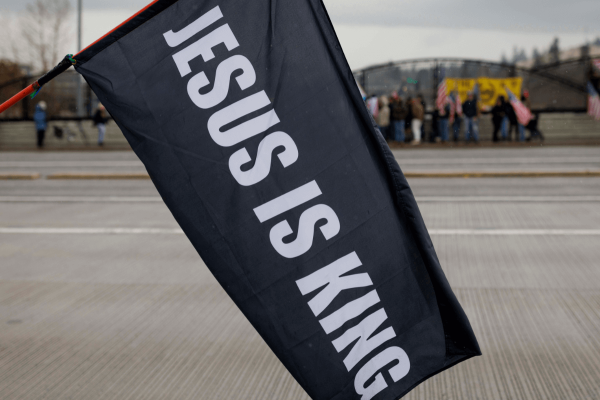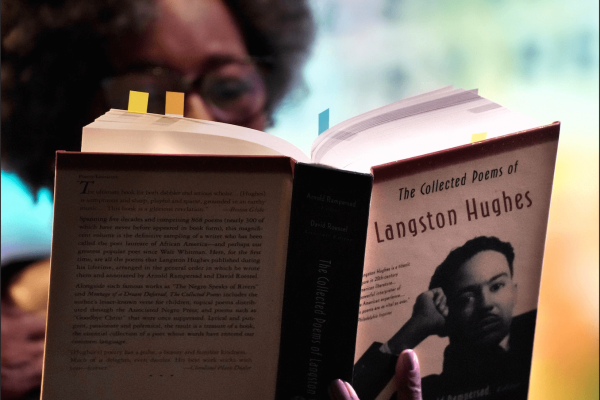The Constitution isn’t just a symbol, it’s the base document for our democratic republic. And Jamelle Bouie says that in a time of crisis, it's important to remember that in a democracy, we have ownership over its meaning.
In Nosferatu, writer-director Robert Eggers seeks to empower Ellen as a martyr: Yes, her death is a tragedy. But by giving her agency in a world that sought to deny her humanity, Ellen is a savior, one who has laid down her life for her loved ones and for the world. The Christian parallels are obvious.
For a Christian, standing up to oppressors isn't just a way to love the oppressed. It's also a way to love oppressors themselves by calling them to repentance.
In ‘Christ in the Rubble,’ Palestinian pastor Rev. Munther Isaac surveys the devastation of his homeland and finds God in the most unexpected places.
For the ninth year in a row, Sojourners honors Women’s History Month with an article highlighting revolutionary women shaping the church. This year’s list includes theologians, filmmakers, illustrators, musicians, pastors, and academics. Our nominees engage in diverse work, but these women are united through a fearless pursuit of justice. They lead through empathy. They build community. They fight against rising tides of hopelessness in our world with messages of radical and inclusive love.
The term “woke” has become something of an anathema in recent years. Those on the Right use “woke” to disparage anything they think of as social justice or political correctness. Those on the Left initially deployed the term to describe a person who was socially conscious, but after it became apparent that banks and corporations were adopting “woke” coded language, and that the semantics of “wokeism” were more performative than substantive, “woke” fell out of vogue.
Faith leaders, historians, and advocates are speaking out after the National Park Service removed its webpage dedicated to Rev. Pauli Murray, a pivotal figure in civil rights history who broke barriers as both a legal scholar and the first perceived Black woman ordained as an Episcopal priest.
Since arriving to the White House, the richest man in the world, Elon Musk, has been on a destructive whirlwind through the federal government. At the behest of President Trump, the South African billionaire and chief of the Department of Government Efficiency has led an effort to illegally gut numerous federal agencies, fire tens of thousands of federal workers, and perpetrate fraud while claiming to root it out.
Regarding the seemingly intentional turmoil of Musk’s actions, Trump bragged at the Conservative Political Action Conference that his administration had “effectively ended the left-wing scam known as USAID. The agency’s name has been removed from its former building, and that space will now house agents from Customs and Border Patrol.” Taken alone, these actions have the makings of an oligarchic heist or a coup that cripples the government’s capacity to provide and protect public goods.
But within a wider aperture of the administration’s priorities — ripping apart families, hoping to establish concentration camps, offering refugee status to white Afrikaners, attacking trans people, and engaging in a “war on woke” across institutions — a coherence comes into focus amid the chaos. These are men who destroy to build a racial hierarchy in service of their own wealth and profit. Or as political commentator Elie Mystal of The Nation has framed it, they are bringing a “a neo-apartheid economic agenda to the US government.”
When I reread the prologue of my 2021 book, A More Perfect Union, I’m reminded just how badly so many of us underestimated the backlash that followed the racial awakening of 2020 — and how durable the forces of grievance, fear, and economic dislocation have become. I wrote about my hope that Trump’s Big Lie and his corresponding efforts to overturn the 2020 election results would serve as a wake-up call to protect and strengthen our democracy. Yet that lie only got worse and our urgent calls to save our democracy failed to break through. I hoped that lessons from the pandemic would inspire a greater commitment to build a more equitable economy, yet the backlash against shutdowns and vaccines seemingly exacerbated our culture wars and individualism.
President Donald Trump has signed an executive order setting up a task force to counter “anti-Christian bias.” Trump claims that the task force is necessary to fight discrimination against Christians. But in practice it seems designed to enforce a very narrow version of conservative Christianity. The task force will counter efforts to prosecute demonstrators who block access to abortion care and to allow for discrimination against LGBTQ+ people on campus. It will encourage the federal government to elevate right wing Christianity as a national ideology.
Imposing Christian morality on the U.S. seems out of step with the separation of church and state. But it’s not exactly out of line with American tradition. For example, at the height of the postwar Red Scare in March 1953, leftist poet and activist Langston Hughes was hauled before Sen. Joseph McCarthy and the Permanent Subcommittee on Investigations. PSI was looking to root out communist influence. But in that regard, many of the questions centered on religion — and on a poem which the subcommittee believed showed that Hughes was anti-religious and therefore pro-communist.
The poem in question was “Goodbye, Christ,” which Hughes wrote on a trip to Soviet Russia in 1932.









